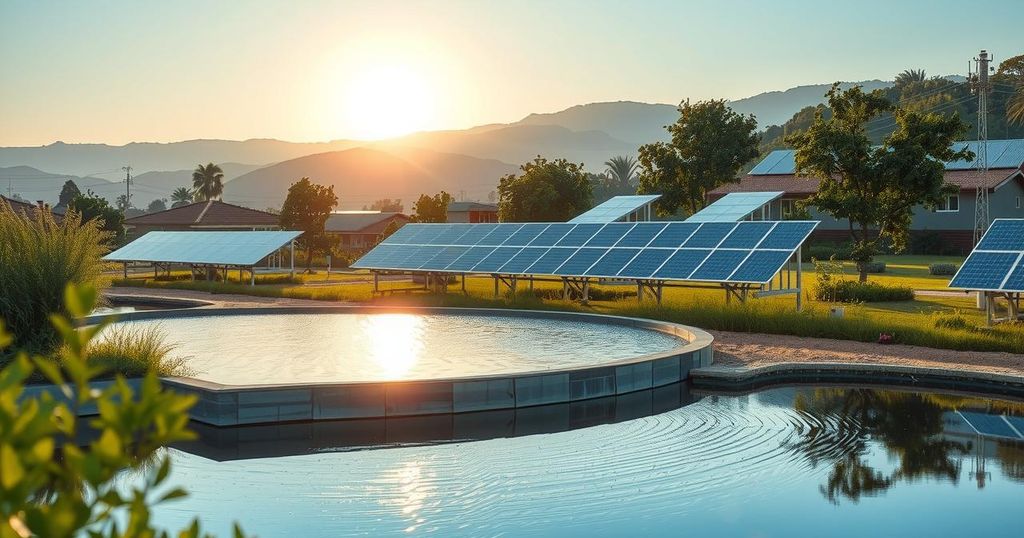Enhancing Drought Resilience through Solar-Powered Water Solutions in Hanzila, Zambia

Global climate change is leading to increased droughts and water scarcity, particularly harming low-income rural populations in Southern Zambia reliant on rain-fed agriculture. Projects like solar-powered boreholes are essential to improve access to clean water, enhance resilience, and support local agriculture. Collaborating with community stakeholders will help in addressing these critical challenges effectively.
The impacts of climate change are evident globally, with increasing droughts, floods, and temperature fluctuations affecting both ecosystems and human communities. Low-income rural populations, particularly in regions like Southern Zambia, face severe challenges due to their heavy reliance on rain-fed agriculture, making them vulnerable to food insecurity and health risks. Water scarcity during droughts limits access to safe drinking water and sanitation facilities, further exacerbating the hardships faced by these communities.
To combat these challenges, immediate and long-term strategies are essential. Community-based initiatives, such as the establishment of solar-powered boreholes, can significantly improve resilience by ensuring access to clean water independent of erratic rainfall. Efficient water management practices help to bolster climate resilience by sustaining livelihoods and protecting ecosystems from the adverse effects of climate-related events.
In Southern Africa, including Zambia, persistent droughts have increasingly compromised water resource availability for both domestic use and agricultural activities. As rural communities struggle with limited water infrastructure, many resort to utilizing unsafe sources, which can pose health risks. Moreover, geographical factors often hinder access to clean water, requiring residents to travel long distances, which consumes time and energy that could be directed toward other productive activities.
Inadequate rainfall continues to hinder agricultural productivity, making it difficult for small-scale farmers who rely on rain for their livelihoods. The recent 2023/2024 farming season highlighted the severity of this issue, with significant crop losses due to insufficient water. Additionally, many water sources have diminished, further complicating access to clean water for drinking and irrigation, particularly for vulnerable groups in rural areas.
Addressing these challenges necessitates an integrated approach that includes community involvement and investment in water infrastructure. Initiatives such as rainwater harvesting and constructing multi-purpose water facilities are crucial for enhancing water availability at the community level. Effective water storage and distribution systems are paramount for ensuring a reliable water supply, especially during times of drought.
As climate change effects intensify, incorporating climate resilience strategies within community programs becomes increasingly vital. Ensuring adequate water resources directly contributes to improved health and economic development in rural areas, leading to sustainable improvement in living conditions. The solar-powered borehole project initiated in Hanzila community aims to fulfill these goals, having begun in February 2023 in collaboration with local authorities and organizations.
The escalating impacts of climate change manifest through frequent droughts and unpredictable weather patterns that challenge traditional farming practices, especially for low-income rural populations. These communities often lack the financial and infrastructural means to adapt to such changes, facing increased risks of food scarcity and health issues. The introduction of sustainable water solutions, like solar-powered systems, is vital for improving resilience against climate-induced water shortages, which is especially significant in regions such as Southern Zambia that are prone to persistent droughts and water scarcity.
The need for effective water management and sustainable solutions to access clean water in drought-affected areas has never been more urgent. Initiatives like solar-powered boreholes represent crucial steps toward alleviating water scarcity, enhancing agricultural productivity, and improving the overall quality of life for vulnerable rural communities. Collaborative efforts among local authorities, organizations, and the communities themselves will be pivotal in building resilience against the ongoing impacts of climate change.
Original Source: reliefweb.int






